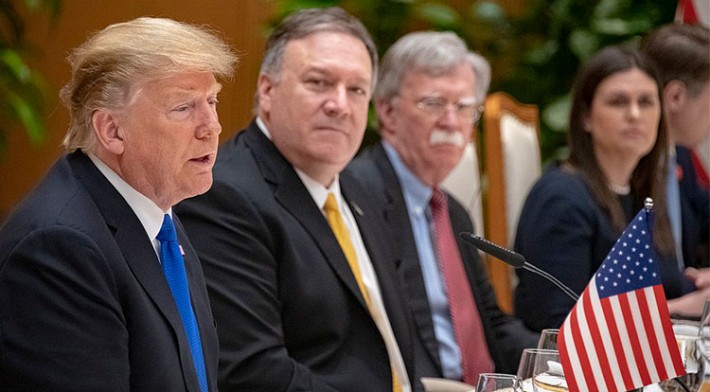by Sébastien Périmony, @SebPerimony
Saturday, June 15, 2019, a conference on the New Silk Road was held at the headquarters of the Félix Houphouët-Boigny Foundation for Peace Research in Yamoussoukro, Ivory Coast.
This conference, organized by the Association pour la Sauvegarde et la Promotion de la Pensée d’El Adj-Boubacar Gamby Sakho (ASPP-BGS) in partnership with the Foundation Félix Houphouët-Boigny for Peace Research, brought together about 400 young students, mainly from the Institut National Polytechnique Houphouët-Boigny de Yamoussoukro.
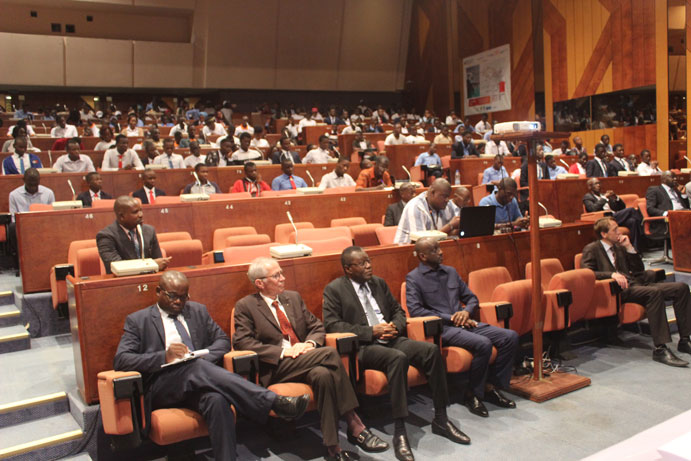
The objectives were as follows:
- Improve China’s knowledge and visibility in Ivory Coast
- Present the example of Chinese development, with particular emphasis on the crucial role played by the Silk Road
- Lay the foundations for the bilateral partnership between Ivory Coast and China, between Chinese and Ivoirian industrialists, researchers, etc.
- Highlight the impact of culture on the harmonious development of Ivory Coast
- Make Yamoussokro the scientific capital of West Africa in infrastructure, medicine, information technology and telecommunications (5G, Big data, artificial intelligence), robotics, space education.
- Make Yamoussokro a “smart-city”
- Develop from Yamoussokro special economic zones and industrial parks such as Ethiopia or Kenya.
The Master of Ceremonies, Dr. Joseph Kobi, introduced the conference with two quotes from President Félix Houphouët-Boigny, who urged the integration of culture into the dynamics of development.
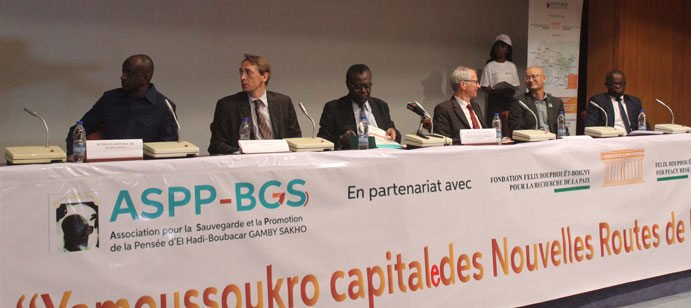
Two conferences were given on the following themes: “Presentation of the New Silk Road: Opportunities for Africa, the Case of Ivory Coast” and “Africa and the New Silk Road: Cultural and Strategic Approach.” Their moderator was Professor Bamba, a professor and researcher in history at the Félix Houphouët-Boigny University in Cocody, Ivory Coast.
The first lecture was given by Mr. Sébastien Périmony of the Schiller Institute. The speaker first presented the purpose of the New Silk Road project, which is to put an end to centuries of conflict, war and colonialism and instead, move towards “a world of mutual development and dialogue of cultures.”
He described the history of the idea of connecting the world through major infrastructure projects, dating at least back to the 1890s, with the proposal to connect the American transcontinental railway to the railway network in Europe.
Périmony then described the 1975 proposal of American economist Lyndon LaRouche (late husband of Schiller Institute founder Helga Zepp-LaRouche) which was the creation of an International Development Bank that would be entirely dedicated to industrial and infrastructure development. In 1980, LaRouche proposed a comprehensive plan for the industrialization of the African continent.
Building on the economic concepts developed by Mr. LaRouche, the speaker outlined three economic principles: the potential for relative population density, leapfrog, and energy-flux density.
Turning to the issue of New Silk Road, Périmony said that this project began to take shape following the announcement in September 2013 by President Xi Jinping in Kazakhstan launching the “One Belt, One Road” initiative, project based on the idea of a “community of shared future of humanity.”
With regard to the particular case of Africa, the moderator clarified the African Union’s desire to link, by 2063, all African capitals with a view to cooperation with the rest of the world. As such, several projects have been detailed :
- Transaqua, which consists in revitalizing Lake Chad
- The trans-Sahelian, a railway project that will go from Mauritania to Chad via Mali and Niger
- The Lumumba 2050 project aimed at modernizing the Democratic Republic of Congo with 9,500 km of high-speed rail and the development of the Congo River
- The Great Inga Dam in the D.R.C. and the interconnection of the African Great Lakes in east
- The Great Green Wall, a project to reforest 12 African countries to stop the spread of the Sahara
- The development of the Lac Figuibine system in Mali: an irrigation project aimed at the establishment of a modern agriculture
- Rail modernization in Nigeria: two lines of about 1400 km each are in progress. This could contribute to the reduction of terrorism.
With particular reference to Ivory Coast, emphasis was given to the construction of the railway loop in West Africa, known as Africarail. A project that would be an important first step in the industrialization of the country. This railway loop, which would start in Abidjan, would pass through Yamoussoukro, then on to Burkina Faso, Niger, Benin and Togo, would strengthen Yamoussoukro’s central position as the scientific capital of West Africa. It should be recalled that the Institut National Polytechnique, which is unique in the region, already welcomes some students from other neighboring countries. This rail loop will be the central part of the broader trans-Sahelian project and would therefore place Côte d’Ivoire as an inevitable center in the development of the sub-region.
The second lecture was delivered by Mr. Pierre Fayard, Professor Emeritus at the University of Poitiers. The speaker developed the theme “Africa and the New Silk Road: A Cultural and Strategic Approach” around culture, the economy and the strategy of conquest.
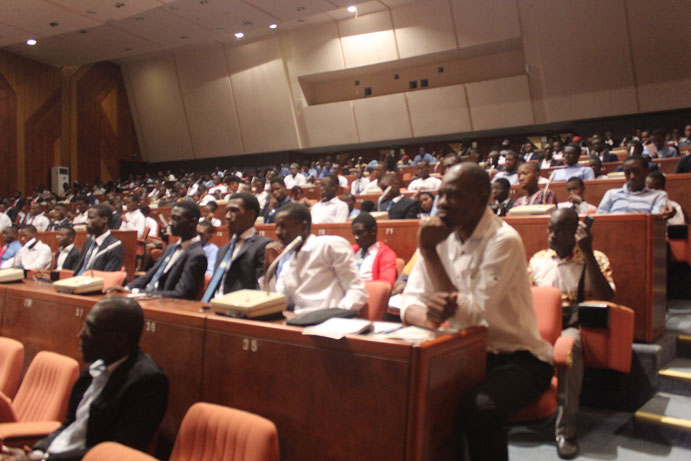
A question and answer session provided an opportunity to gather participants’ concerns which included questions about the debt repayment generated by the New Silk Road; the concern of moving to a neo-colonialism; the participation of African States in the determination of infrastructure construction projects; the means for Africa to achieve Chinese cultural integration; the accession of all African countries to the Silk Road project; the issue of equity and equality in Sino-African cooperation.
The response to presentations revealed that this project will not be launched in Africa without the support of Africans. It will be a win-win cooperation.
Then, from June 18-20 2019, Périmony traveled to Angola for the ANGOTIC — Angola ICT Forum 2019 — a global event dedicated to information and communication technologies (ICT) for knowledge sharing. The event is a networking hub for government entities, industry players and new mobile service providers that brought together more than 8,000 participants and 150 speakers over three days, from various sectors, public and private, actors from across the ICT ecosystem in the country and abroad.
This information and communication technology exhibition “Angotic 2019,” targets all technological tools that aim to provide solutions to problems related to health, education, agriculture, fishing, etc. National and international speakers addressed various topics related to the digital economy and what some call “the fourth industrial revolution.”
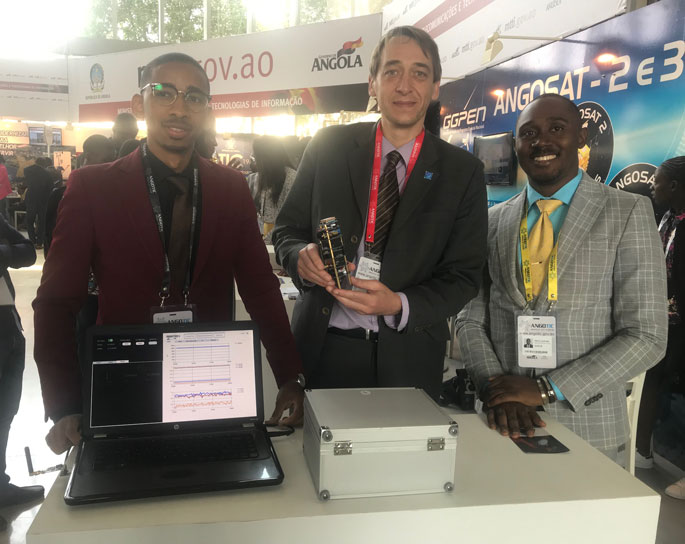
Sébastien Périmony, representing the Schiller Institute, was able to speak on the theme “Education in the Digital Era.”
Before more than a 100 people, including the Secretary of State for Technical Education, managers of an Angolan telecom company Unitel S.A., and IBM, as well as a professor of law at Agostinho Neto University, Périmony presented the Schiller Institute’s dossier on the New Silk Road and its impact in Africa, requiring a revolution in education on the continent to mobilize young people around the major infrastructure, science and technology projects on the horizon. (see the full speech below)
“We believe that over the next three years, the projects will help to connect all parts of the country, especially as we evolve and provide more and more ICT services to the population” said José Carvalho da Rocha, Telecommunications and Information Technology, at a round table attended by Rwanda’s Minister of Information and Communication Technologies and Innovation Paula Ingabire, former Prime Minister of Cape Verde José Maria Pereira Neves, and former Haiti Prime Minister Laurent Lamothe.
The Angolan minister stressed the commitment to the implementation of structural projects such as the deployment of a 22,000 km fiber optic network.
Paula Ingabire offered Angola a partnership in these areas, announcing the signing, during the event, of a memorandum of understanding that will allow the governments and companies of both countries to transfer their knowledge and technologies.
Angola does not cover 50% to 60% of what it could develop in the field of telecommunications, so the potential for investment in the sector is very high. Introducing the forum, Angolan Vice President Bornito de Soussa Baltazar Diogo stressed the government’s focus on the digital transformation sector, but argued that the executive must first examine all sectors of activity, from submarine cables to optical fiber and satellites. About 65% of African communities are located in rural areas and most often have no access to digital services.
Historic day for Angola
The very first satellite produced in Angola was launched in Cabo Ledo on Wednesday, June 19, 2019, on the occasion of Angotic 2019. Called “CanSat,” the mini-satellite is the result of collaboration between the National Space Program Management Office (GGPEN), the Ministry of Telecommunications and Information Technology (MTTI), the Department of Space Science and Applied Research (DCEPA), and several Angolan students.
The conference participants were able to watch the launch live, remotely from the conference in Luanda, which was broadcast from a helicopter at an altitude of 500 meters, and waited with apprehension to see if the results were captured from the ground by the students who set up the project. The emotion reached its peak when the first results arrived on the students’ computers and the room exploded with joy and endless applause erupted to celebrate this historic day in Angola. Long journeys always start with a first step.
The excitement was palpable at the various stands dedicated to Angolan space policy, and the mini-satellite was present on the Angosat stand (the Angolan satellite program).
Agreement with France
According to the newspaper Jornal de Angola, a technical and scientific cooperation protocol, valued at $1.2 million, was signed in Luanda by the Agostinho Neto Universities (UAN) and the Belfort Montbéliard University of Technology (UTBM) in France. The agreement provides for a disbursement of $600,000 by each party, mainly to facilitate the two-way mobility of teachers and students from both countries, as part of an exchange of experiences inherent in the industrial systems engineering course. Pedro Magalhães, Dean of Agostinho Neto University, and Ghislain Montavon, Dean of the Belfort Montbéliard University of Technology, signed the agreements. The meeting coincided with the Angotic 2019 in Luanda, where key issues in the sector were discussed.
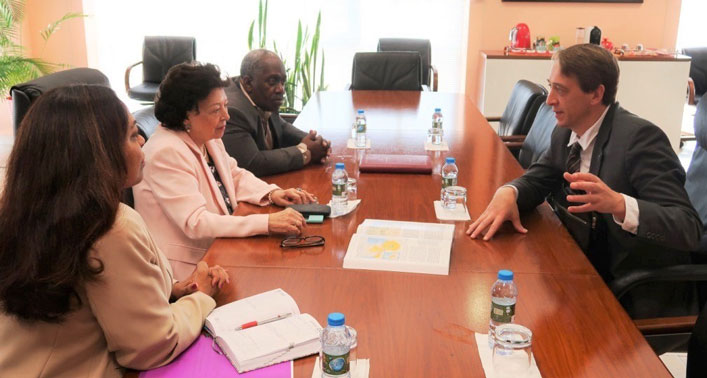
On June 20, Périmony was met with the president of the Agostinho Neto foundation, the widow of the first President of Angola Agostinho Neto, and his daughter Irene Alexandra Neto, who is deputy in Angola and presented the Schiller Institute report on the New Silk Road.
SPEECH DELIVERED AT ANGOTIC 2019 THE FORUM BY SÉBASTIEN PÉRIMONY to present the “African space” part of the Schiller Institute’s report on the New Silk Road
Mr. Secretary of state,
Distinguished Guests,
Ladies and Gentlemen,
It is my great honor to be invited to attend the conference held in such a beautiful country. I am responsible for African issues at the Schiller Institute and I am very honored to speak here on behalf of its president, Mrs. Helga Zepp-LaRouche. I will start by quoting a statement she recently made in the Global Times, a Chinese newspaper, just before her intervention at the Conference on Dialogue of Asian Civilizations forum in Beijing last month [May 15, 2019].
“I think we are probably the generation on whom later generations will look back to, and say, ‘Oh! This was really a fascinating time, because it was a change from an epoch to another one.’ And I have an image of that, which is, this change that we are experiencing right now, is probably going to be bigger than the change in Europe between the Middle Ages and modern times. Now, I think we are before, or the middle of such an epochal change, where the next era of mankind will be much, much more creative than the present one, and that’s something to look forward to, because we can actually shape it, and we can bring our own creative input into it. And there are not many periods in history when that is the case: So we are actually lucky.”
I’ve been invited to present the report that we have just published, “The New Silk Road Becomes the World Land-Bridge: A Shared Future for Humanity.” A 500-hundred pages report which has been produced by our organization and which was already translated into Chinese, Arabic, and recently in French too. This report presents the new paradigm initiated by President Xi Jinping in 2013 with the launching of the “One Belt, One Road initiative” that integrates (includes plutôt) major development projects from around the world. An important part of this report is devoted to the future of Africa. Because the New Silk Road is also aimed at helping Africa do what the Chinese managed to achieve, which is already considered as an economic miracle, that is, pulling 700 million people out of poverty.
So as I said, an important part of this report is devoted to the development of Africa. With a top-down approach, which consists in laying the basis for the breakthroughs in science and the creation of new technologies that define the future of mankind.
Ironically, the deficit of basic infrastructure in Africa, as it was in China, is an advantage, in that it allows nations to skip the intermediate stages of development that occurred over centuries in the industrialized countries, to leapfrog directly into the technologies that are at the frontier. This is the approach that has been taken by China, deploying high-speed rail and magnetically levitated trains, and fourth-generation nuclear fission technology. Similarly, China’s space program is not simply repeating what other nations have done, but is carrying out challenging missions that have never been attempted before.
The great projects underway, and the drive to lift the remaining millions in China and Africa out of poverty, will depend upon the use of space technology. Satellite communications will connect rural populations to their neighbors, their governments, and to the rest of the world, and provide capabilities for distance learning and telemedicine. Data mapping of geographic and geologic features will inform the location (je comprends pas, s’il s’agit de permettre d’identifier le lieu idéal pour la mise en place de nouveaux projets, je dirais : will permit to choose ideal locations for new projects and transport routes) of new projects and transport routes, and to detect new water and mineral resources.
In the future Earth remote sensing will monitor agricultural crops for drought and disease, provide disaster warnings, and locate ocean resources. Technology has recently been developed, using GPS satellites, in order to monitor the most minute movement of large structures, such as bridges and dams.
But even more important than the practical benefits of space exploration is the drive for knowledge that is humanity’s sole responsibility. The greatest contribution space programs will make in Africa, will be to develop the talent and creativity of a new generation of scientists, who will make new discoveries far into the future. This is why education is the priority.
Unfortunately, and it is the subject of the day: today the level of education in Africa is still too low. The UN Educational, Scientific and Cultural Organization (UNESCO) which tracks literacy publishes statistics to show that the literacy rate for Sub-Saharan Africa was 65% in 2017. In other words, one-third of the people ages 15 and above were unable to read and write.
And if Africa in general, or any country in particular, wants to succeed in its industrialization process, and in “Making the Future,” it will have to be implemented through a very efficient education program.
You know that before the French Revolution, 50% of men and 70% of women were not able to read or write!
But In 1801, Jean-Antoine Chaptal, the father of public education in France stated in 1801: “To not make public education free for all is to strike the people in their very body, to cause the nation to become demoralized. Therefore, it is a necessity to ensure education and to make it general and available to all. The government must create public schools everywhere.”
He was a collaborator of Lazare Carnot and Gaspard Monge who found the Ecole Polytechnique, which has since been one of the best schools in the world, and generated major breakthroughs in science and technology. At the same time l’Abbé Grégoire has found the CNAM, the national conservatory of arts and trades in 1794 in order to “perfect national industry.” And I think those could can be models for Africa’s education strategy.
That said where should we start first? So the first thing to do is: One village, One school in all the countries in Africa!
And at the same time, building universities for science and technology as it is currently done in China, as I said in my introduction: high-speed rail, fourth-generation nuclear fission technology and fusion, modern agriculture, space industry and so on and so forth.
So a double dynamics, one village, one school and then universities providing the highest education possible in science and technology and art.
I’m optimistic, in 2017, science and education ministers representing the nations of the Africa Union adopted the first “African Space Policy: Towards Social, Political and Economic Integration.” It describes the benefits of space technology as “crucial to the economical development of the continent”
We need to prepare the youth to meet this challenge.
Dr. Lee-Anne McKinnell, currently the Managing Director responsible for the Space Science Program of the South African National Space Agency (SANSA), explained that through her program, students from throughout Africa are being trained, with exchange visit among student from Kenya, Nigeria and Zambia.
On Feb. 11th this year, Angola’s Minister of Telecommunications and Information Technology José Carvalho da Rocha said that Angosat-2, under construction in France, will be operational in 2021. And built by our French aerospatial company Airbus. I noticed that recently ANGOSAT EDUCA was launched here as an educational-purpose application, an initiative of the Office of Management of the National Space Program (GGPEN), in the field of space education, which aims to disseminate basic concepts on space and gather information about the ANGOSAT project, which is framed in the National Space Program.
So to conclude: The announcement of the One Belt, One Road initiative has defined a new paradigm in the world. It is not a hypothetical or academic speculation, it is a reality taking hold in the world now.
There is a profound reason for optimism for the African continent, because with the rise of China, and especially the New Paradigm which emerged with the Belt and Road Initiative, the world has been changing, especially in the last five years at an incredible speed. What China has done with the New Silk Road is to develop a new model of relations among nations, and it is an initiative which is open to all nations of the world.
This report presents in detail an integrated, continental transport plan, a trans-African transport network, but also inter-regional project for water, the Transaqua project, to fight desertification with the great green wall, the development of the Republic Democratic of Congo and its neighbors, and many others projects.
So now it is high time to see Africa with the eyes of the future.
Thank you very much









